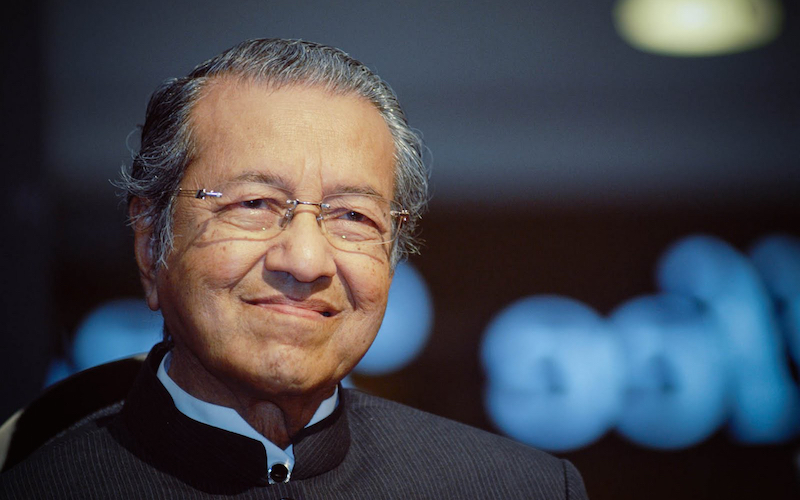
How Malaysia’s Statesman Emeritus Became A Broken Record
On October 31, 2003, Malaysia’s then-Prime Minister Mahathir Mohamad stepped down after 22 years in power and handed off his duties to his handpicked successor, Abdullah Ahmad Badawi. It was supposed to a watershed moment in Malaysia’s politics, with the iron-fisted Matathir (known informally as “Dr. M” among his countrymen) stepping down after a tenure marked as much by breakneck economic development as it was by the trampling of civil liberties and ethnic politicking. Despite pledging before the end of his tenure that he would “leave completely” once his term in office was over, Dr. M has done exactly the opposite. For the second time since giving up power, he has placed himself at the head of a campaign to unseat a successor who he believes is insufficiently supportive of Mahathir-era policies and the former premier’s legacy.
In 2008, it was Badawi who found himself on the wrong side of a campaign by Mahathir to unseat him. That particular crisis only came to an end when current Prime Minister Najib Razak took over the reins of state. Eight years later, it is apparently Najib’s turn to fend off attacks from his predecessor and former mentor—a campaign notable in that it has brought Malaysia’s anti-government forces together with the man who repressed them for decades. When Mahathir quit the United Malays National Organisation (UMNO) and launched his “Citizens’ Declaration” for Najib’s ouster in early March, over 50 opposition figures and dissident UMNO members were there to sign on.
Mahathir Mohamad’s leading the ongoing anti-Najib campaign is, understandably, seen by some observers as ironic.
From 1981 to 2003, Mahathir ruled Malaysia with what can politely be described as a strong authoritarian streak, locking up over 100 critics of his government through the infamous Internal Security Act (ISA) in 1987 while clamping down on protests and muzzling the press.
When Freedom House examined freedom of the press in Malaysia in its 2003 annual report, it ranked the country “Not Free” and specifically cited the Orwellian-sounding Official Secrets Act, the Sedition Act, and the Broadcasting Act as legal tools Mahathir’s government used to silence criticism. At the same time, the iron-fisted PM undermined every competing locus of power in Malaysia: both the nation’s judiciary and its traditional monarchies were forcibly bent to the will of UMNO in general and the Prime Minister in particular.
It was Mahathir’s industrialization programs and controversial infrastructure projects, like the infamous “crooked bridge,” that blurred the lines between politics and business and created the crony capitalist trends that persist in Malaysia today. The former leader, long known for his off-color remarks, does not deny that history. Just last month, Mahathir admitted he was a “dictator” while in power. The “crooked” bridge between Malaysia and Singapore, a plan Mahathir rolled out at the end of his tenure, was only one of the grandiose projects he expected his successors to pursue unblinkingly. When Badawi decided Singapore’s conditions were too steep and abandoned the idea in 2006, he provoked an all-out assault from his former boss.
The man who reshaped UMNO in his own image quit the party in 2008, offering the proviso that he would only return after Badawi’s resignation. He got his wish and came back into the party fold in 2009. Less than a decade later, Mahathir’s campaign against Najib seems to be following an almost identical script with the one-time leader leaving UMNO for the third time this past February.
Najib, for his part, has not shied away from shooting back at his most outspoken critic. In his view, Mahathir’s decision to align himself with the opposition coalition against UMNO undercuts the ruling party and jeopardizes both the prosperity and political status of the Malay ethnic community. The embattled PM’s criticisms are hardly unfounded because over the course of his political career, the firebrand ex-premier has regularly stoked controversy with his condescending and even racist caricatures of his own people. In 2014, Mahathir described Malays as “lazy” and claimed that they lacked values and ethics, leaving them to be outperformed by Malaysia’s ethnic (specifically Chinese) minorities.
Last month, Najib’s government also removed Mahathir from his post as an advisor to the state energy company Petronas. In a small measure of retribution, Abdullah Ahmad Badawi replaced him. As Najib and his ministers pointed out, Mahathir could not work for the government while actively trying to topple it.
While Malaysia’s current showdown offers many parallels to 2008, its most striking element might be the political alliances Mahathir has formed with the opposition. Specifically, imprisoned opposition head Anwar Ibrahim—Mahathir’s onetime anointed successor who fell from grace in a politically-motivated 1998 sodomy trial organized at his behest—announced his support for the former Prime Minister’s efforts in early March. Even though Anwar joining forces with Mahathir would have once been unthinkable, the strange bedfellows have thus far failed to make much headway in toppling Najib’s government. At 90 years old, it’s unclear what Dr. M’s endgame is with this latest foray out of retirement.

